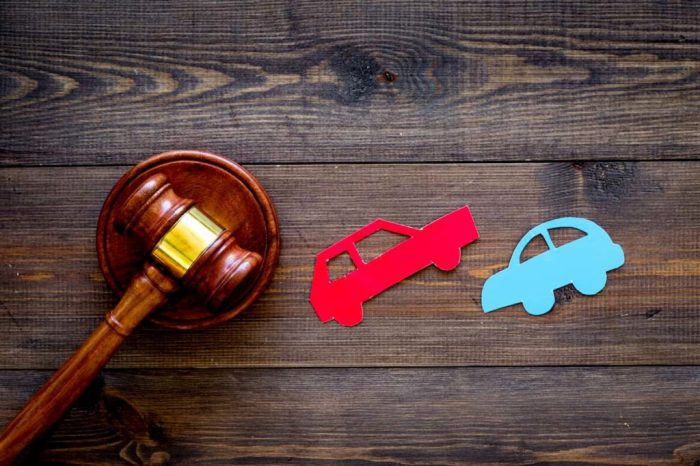Legal car accident lawsuits are complex and often stressful legal proceedings that can have a significant impact on the lives of those involved. Understanding the legal framework, types of lawsuits, liability, damages, and the process of filing a lawsuit is crucial for anyone who has been injured in a car accident. This comprehensive guide will provide you with the knowledge and insights you need to navigate the legal system and seek justice.
Car accidents are a leading cause of injuries and fatalities in the United States, and the legal process involved in seeking compensation for damages can be daunting. This guide will help you understand your rights and options, and provide you with the tools you need to make informed decisions about your case.
Legal Framework

The legal framework governing car accident lawsuits is complex and varies from jurisdiction to jurisdiction. However, there are some general principles that apply in most cases.
In the United States, car accident lawsuits are governed by state law. Each state has its own set of laws that govern the filing of car accident lawsuits, the types of damages that can be recovered, and the process for resolving car accident claims.
Some of the most important laws that govern car accident lawsuits include:
- Negligence: Negligence is the failure to exercise reasonable care. In a car accident lawsuit, the plaintiff must prove that the defendant was negligent in order to recover damages.
- Comparative negligence: Comparative negligence is a legal doctrine that allows a plaintiff to recover damages even if they were partially at fault for the accident.
- Contributory negligence: Contributory negligence is a legal doctrine that bars a plaintiff from recovering damages if they were more than 50% at fault for the accident.
- Damages: Damages are the monetary compensation that a plaintiff can recover in a car accident lawsuit. Damages can include compensation for medical expenses, lost wages, pain and suffering, and emotional distress.
Insurance companies play a major role in car accident lawsuits. In most cases, the defendant’s insurance company will be responsible for paying any damages that the plaintiff is awarded.
Legal car accident lawsuits can be complex and time-consuming, but they can also be essential for victims to obtain compensation for their injuries. In some cases, a car crash lawsuit settlement can be reached without going to trial.
This can be a faster and less expensive way to resolve the case, and it can also help to avoid the uncertainty of a jury verdict.
To learn more about car crash lawsuit settlements, visit Car crash lawsuit settlement. However, if a settlement cannot be reached, the case will proceed to trial, where a jury will decide whether the defendant is liable for the plaintiff’s injuries.
Insurance companies often try to settle car accident claims before they go to trial. Settlements are often less expensive and time-consuming than trials. However, settlements may not always be in the best interests of the plaintiff.
Conclusion: Legal Car Accident Lawsuit

Navigating a legal car accident lawsuit can be a challenging process, but it is essential to remember that you are not alone. There are resources available to help you understand your rights and options, and to guide you through the legal process.
By seeking legal advice and support, you can increase your chances of obtaining a fair and just outcome.
Essential FAQs
What are the most common types of car accident lawsuits?
Legal car accident lawsuits involve a complex legal process. To ensure a successful outcome, it’s crucial to understand the Accident litigation legal process. This process involves gathering evidence, filing a complaint, and negotiating a settlement or going to trial.
Legal car accident lawsuits can be challenging, but by understanding the legal process and seeking professional guidance, victims can maximize their chances of obtaining fair compensation for their injuries.
The most common types of car accident lawsuits are negligence lawsuits, which allege that the defendant driver was careless or reckless and caused the accident.
Other types of lawsuits include strict liability lawsuits, which hold the defendant liable even if they were not negligent, and product liability lawsuits, which allege that a defective product caused the accident.
What are the elements of a negligence lawsuit?
The elements of a negligence lawsuit are duty, breach of duty, causation, and damages. The plaintiff must prove that the defendant owed them a duty of care, that the defendant breached that duty, that the breach of duty caused the plaintiff’s injuries, and that the plaintiff suffered damages as a result of the injuries.
Legal car accident lawsuits are a complex process, but they can be necessary to obtain compensation for injuries and damages. In some cases, the accident may be caused by the fault of another driver.
In such cases, it is important to understand the legal principles of legal fault car accidents to determine liability and pursue a successful lawsuit.
What are the different types of damages that can be recovered in a car accident lawsuit?
The different types of damages that can be recovered in a car accident lawsuit include compensatory damages, which are designed to compensate the plaintiff for their losses, and punitive damages, which are designed to punish the defendant for their conduct.




